Everyone has spent the past year reconciling with loss. Amid a pandemic and myriad social uprisings, the state of the world has come starkly into focus. On her debut album, What We Lost, Janette King takes on the aftermath of grief and loss, looks at these issues unflinchingly, and attempts to find her own resolution.
The Montreal-based/Vancouver-born producer, artist and songwriter has crafted an album that takes a cold, hard look at life and death. social problems. and their relationship to her own life. While focusing on her own relationship with loss, King makes her personal message one that rings out universally, all the while wrapping it up in a pristinely produced masterclass of R&B sheen.
King unpacks a lot of her own personal grief on What We Lost. The loss of a relationship, the loss of family and friends, and her own experiences with a loss of self. It's startling to listen to her tackle such deeply personal issues and how she has been able to use these to produce affecting art. On "Change," produced with Jordan Esau, King speaks out about her relationship with police violence against the Black community. When she sings, "I'm no longer sad / I don't want your pity / I want change," it's deeply stirring to hear her simply state this in such plain terms. Her message here is one that should upset you, but also inspire you to make the intention to help create a better world for everyone. As a protest song, it succeeds on every level — and as an exquisitely produced hip-hop track, it shines. King seamlessly jumps between genres across What We Lost. One of the album's highlights, "Found a Way," blends house beats with King's keen ear for pop melodies. There are hints of Erykah Badu, Solange and Janet Jackson — but even with these touchstones, she makes the sound entirely her own.
Janette King has made a very special debut album that ought to place King right near the top of the list of this country's up-and-coming R&B artists. What We Lost is fully realized and has a confidence that is well beyond King's years. The album's title track finds King flirting with techno, and it's something that would fit comfortably on a playlist beside Ela Minus, while "You Don't Love Me" wouldn't seem out of place sandwiched between any Alicia Keys tracks. To do all of this while sounding completely herself is a reflection of King's strength as a songwriter.
(Hot Tramp)The Montreal-based/Vancouver-born producer, artist and songwriter has crafted an album that takes a cold, hard look at life and death. social problems. and their relationship to her own life. While focusing on her own relationship with loss, King makes her personal message one that rings out universally, all the while wrapping it up in a pristinely produced masterclass of R&B sheen.
King unpacks a lot of her own personal grief on What We Lost. The loss of a relationship, the loss of family and friends, and her own experiences with a loss of self. It's startling to listen to her tackle such deeply personal issues and how she has been able to use these to produce affecting art. On "Change," produced with Jordan Esau, King speaks out about her relationship with police violence against the Black community. When she sings, "I'm no longer sad / I don't want your pity / I want change," it's deeply stirring to hear her simply state this in such plain terms. Her message here is one that should upset you, but also inspire you to make the intention to help create a better world for everyone. As a protest song, it succeeds on every level — and as an exquisitely produced hip-hop track, it shines. King seamlessly jumps between genres across What We Lost. One of the album's highlights, "Found a Way," blends house beats with King's keen ear for pop melodies. There are hints of Erykah Badu, Solange and Janet Jackson — but even with these touchstones, she makes the sound entirely her own.
Janette King has made a very special debut album that ought to place King right near the top of the list of this country's up-and-coming R&B artists. What We Lost is fully realized and has a confidence that is well beyond King's years. The album's title track finds King flirting with techno, and it's something that would fit comfortably on a playlist beside Ela Minus, while "You Don't Love Me" wouldn't seem out of place sandwiched between any Alicia Keys tracks. To do all of this while sounding completely herself is a reflection of King's strength as a songwriter.
